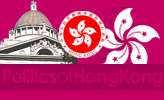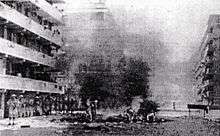Pro-Taiwan camp
Pro-Kuomintang camp | |
|---|---|
| Supporting | Kuomintang |
| Convenor | Johnny Mak |
| Founded | 1949 |
| Ideology |
|
| Political position | Centre-right |
| Legislative Council |
0 / 70 |
| District Councils |
1 / 458 |
 |
|
Politics and government of Hong Kong |
|
Legislature |
| Foreign relations |
|---|
|
Related topics
|
Pro-Taiwan camp or pro-Kuomintang camp (Chinese: 親台派 or 親國民黨派) is a political alignment in Hong Kong. It generally pledges allegiance to the Kuomintang-governed government of the Republic of China (ROC) on Taiwan (1949–2000 and 2008–16). Being called as "Rightists", it was one of the two major political forces in Hong Kong during the first decades of the post-war period of the British colony of Hong Kong, competing with the pro-Communist "Leftists", but has gradually declined after the Republic of China's departure from the United Nations in 1971 and the signing of the Sino-British Joint Declaration in 1984 which decided Hong Kong's sovereignty to be handed over to the People's Republic of China (PRC). Today, it generally aligned with the pan-democracy camp in Hong Kong and the Pan-Blue Coalition in Taiwan.
The pro-Taiwan camp closely follows the Kuomintang's doctrines including the Three Principles of the People and 1992 Consensus. It opposes Taiwan independence and supports universal suffrage in Hong Kong.
History

The support base of the Chinese Nationalist Party (Kuomintang) has existed even before the founding of the Republic of China (ROC), as its founding father Sun Yat-sen was a medical student in the British colony of Hong Kong in the late 19th century and set up anti-Qing revolutionary organisations in Hong Kong. After the founding of the Republic, Hong Kong pro-Nationalist forces remained their close contact with the Kuomintang revolutionary government in Canton. With the Canton's support, the pro-Nationalists and pro-Communists launched the 1922 Hong Kong Seamens' Strike and 1925 Canton–Hong Kong General Strike. In 1927, the pro-Nationalists gained their status as the Nationalist Party was the official government in China until 1949.
The Chinese Civil War saw the influx of pro-Kuomintang refugees to Hong Kong who were driven from their homeland by the Communists. After years of exile and grinding poverty, many of them were steeped in bitterness and yearning for revenge against the Communists. The pro-Kuomintang Triad members played a key part in the Double Ten riots, which was escalated from provocations between pro-Nationalist and pro-Communist factions in 1956.[1]
The political scene in Hong Kong was split into pro-Nationalist and pro-Communist factions in the first decades of the post-war Hong Kong, of which both camps controlled various sectors from labour unions, schools, media to film companies. The largest pro-Nationalist trade unions was the Hong Kong and Kowloon Trades Union Council (TUC) established in 1948, which was the main rival of the pro-Communist Hong Kong Federation of Trade Unions (FTU). The pro-Nationalist forces also owned the Hong Kong Times which was founded in 1949 with an anti-communist stance and was regarded as a Kuomintang party organ.[2] Many major newspapers at that time were also generally pro-Nationalist, such as the Kung Sheung Daily News, Wah Kiu Yat Pao and the Sing Tao Daily.[3]
After the Republic of China's departure from the United Nations, the Taiwanese government lost a great prestige in the Chinese community. The pro-Nationalist forces also suffered a decline. The signing of the Sino-British Joint Declaration in 1984 which decided Hong Kong's sovereignty to be handed over to the People's Republic of China (PRC) also resulted in the diminishing of the pro-Taiwan forces. In the 1990s it saw the two pro-Kuomintang newspapers Hong Kong Times and Hong Kong United Daily closed. The right-leaning Sing Tao Daily also could not classified as a rightist paper anymore after a political metamorphosis.
The pro-Kuomintang camp also tried to participate in the elections as the colonial government introduced representative democracy in the 1980s but could hardly launch an effective campaign. In 1985, it saw the TUC representative Pang Chun-hoi occupied a seat in the Labour functional constituency along with FTU representative Tam Yiu-chung in the first elected Legislative Council of Hong Kong.
In 1994, the pro-Nationalists founded a political party 123 Democratic Alliance to contest in the 1995 first full Legislative Council election. Yum Sin-ling, the leader of the alliance won a seat in the last colonial Legislative Council on the eve of the handover.
Since 1997, it became a small faction within the pro-democracy camp. The Democratic Alliance led by Johnny Mak was founded in 2003 and was affiliated with the radical democratic party People Power. The other pro-Taiwan political groups include the China Youth Service & Recreation Centre.
Notable pro-Taiwan organisations
- 123 Democratic Alliance (dissolved)
- China Youth Service & Recreation Centre
- Democratic Alliance
- Hong Kong and Kowloon Trades Union Council
- Hong Kong Times (closed)
- Hong Kong United Daily (closed)
- Sing Tao Daily (switched side to pro-Beijing camp)